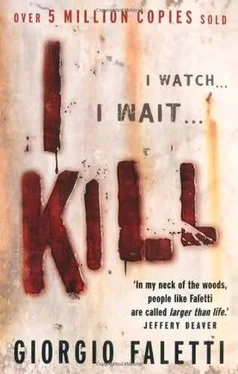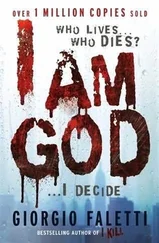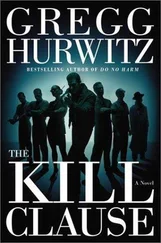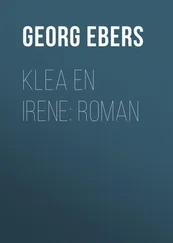Roncaille turned to Dr Cluny, tacitly acknowledging that he was the person best equipped to explain the psychological implications of the story. Cluny removed his glasses and pinched his nose with his forefinger and thumb, as usual. Frank still didn’t understand whether that gesture was the result of a careful strategy to get attention or simply a habit, but it didn’t matter. Having captured his audience, the psychiatrist replaced his glasses. Many of the things he was about to say were new, even to Roncaille and Durand.
‘I spoke with Jean-Loup Verdier, or Daniel Legrand. It wasn’t easy, but I managed to draw a general picture. At times, the subject showed readiness to open up and emerge from his total isolation. Anyway, as the chief said, the Legrand family moved to Provence. By the way, Mme Legrand was Italian. That’s probably why Daniel, or Jean-Loup if you prefer, speaks that language so well. For the sake of clarity I’ll continue to call him Jean-Loup.’
He looked around for their approval and the silence showed that there was no objection. Cluny continued explaining the facts, or what he thought they were.
‘His wife gave birth not long after they moved. According to her husband’s wish for isolation, which had become an obsession, no doctor was called. The woman gave birth to twins, Lucien and Daniel. But there were complications and Lucien was born deformed. There were skin growths that made him look monstrously disfigured. Clinically, I can’t say exactly what it was because Jean-Loup’s testimony is unclear. In any event, DNA tests on the mummified remains found in the bunker prove beyond a shadow of a doubt that they were brothers. The father was overwhelmed by this trauma and his mental state grew even worse. He refused to acknowledge his deformed son, as if he didn’t exist – to the point where he only declared the birth of one child, Daniel. The other boy was hidden inside the house, like a shameful secret. The mother died a few months later, from what the death certificate says were natural causes. There is no reason to suspect otherwise.’
Durand interrupted Cluny.
‘We have suggested to the French government that Mme Legrand’s body be exhumed. But after all these years, and with all the people involved gone, it probably won’t be of any significance.’ Durand leaned back in his chair, his face showing that he found such lack of care for details deplorable. He motioned to Cluny to continue. Cluny pretended it was a duty, not a pleasure.
‘The two children grew up under the rigid, obsessive hand of their father, who assumed total responsibility for their education, without any outside interference. No kindergarten, no school, no friends their own age. Meanwhile, he was really becoming maniacal. He might have suffered from paranoia, obsessed with the idea of having ‘enemies’ everywhere outside the home, which becomes a sort of fortress. That’s only a hypothesis, mind you. There is no concrete proof. The only person allowed to have sporadic contact with the outside world, under his father’s strict control, was Jean-Loup. His twin brother Lucien was kept prisoner in the house. His face was not to be seen, a sort of Iron Mask. Both boys were forced to undergo rigid military training, something like what Legrand had taught to secret service agents. That’s why Jean-Loup is so skilled in so many different fields, including combat and concealment. I don’t want to dwell on it too long, but he told me some horrifying details, perfectly in keeping with the personality he developed later.’
Cluny stopped again, as if it would be better for everyone if the details remained known only to him. As for Frank, he was beginning to understand. Or at least he was beginning to imagine, which was more or less what Cluny had had to do. He was narrating a story that floated in time like an iceberg in the sea, and the part that emerged above the water’s surface was just the tip, a tip covered in blood. It was this tip that the world called No One.
‘I can say that Jean-Loup and his brother had no childhood to speak of. Legrand managed to transform one of the oldest childhood games, the game of war, of playing soldiers, into a nightmare. The experience cemented their relationship. Twins generally have a closer bond than other brothers anyway. There are plenty of examples. And especially since one was obviously handicapped, Jean-Loup took on the task of defending his less fortunate brother, whom his father treated as an inferior. Jean-Loup himself told me that his father’s kindest words were “you ugly monster”.’
There was a moment of silence. Cluny gave everyone time to absorb what he had said. The story they were hearing was confirmation of the trauma Jean-Loup had suffered, but it was beyond what they had imagined. And there was more to come.
‘They had a morbid attachment to each other. Jean-Loup experienced his brother’s distress as if it were his own, but perhaps even more so, more viscerally, because he saw him defenceless before the persecution of his own father.’
Cluny paused again, subjecting them to another nose-pinching ritual. Frank, Roncaille and Durand endured it patiently. He had earned it through his conversations with Jean-Loup, his contact with the darkness of that mind, his attempts to navigate the past in order to explain the present.
‘I don’t really know what set off the episode in Cassis that night so long ago. It might not have been anything special, but simply a series of incidents over time that created the ideal conditions for the tragedy. As you know, a corpse with a disfigured body was found in the burning house.’
Another pause. The psychiatrist’s eyes wandered around the room, not seeking but avoiding the others. As if he were partly responsible for what he was about to say.
‘ It was Jean-Loup who killed poor Lucien. His love for his brother was so fierce that, in his deranged mind, he thought that it was the only way to heal him from his “sickness”, as he put it. As if his brother’s deformity was an actual illness. After that symbolic gesture of liberation came the ritual of skinning off the face to free his brother of his deformity. Later, he killed his father and the housekeeper to make the theory of the double murder-suicide seem credible. Then he set fire to the house. I could add the symbolic meaning of catharsis here, but I think it would be useless and rhetorical, not scientific. Then he ran away. I have no idea where he went.’
Roncaille intervened for an instant to bring the story, which was getting more grotesque and bizarre, back to earth.
‘Documents found in Jean-Loup’s house led us to an account in a Zurich bank. It probably contained money deposited by Marcel Legrand – a great deal of money, by the way. Only a code was needed in order to access that money. We’re unclear as to the source of Marcel’s wealth at this stage, and the trail on him has gone pretty cold. Nor do we know where Jean-Loup lived before he showed up in Monte Carlo, but it’s easy to say how. With that much money, he never had to work.’
Then Attorney General Durand had to have his say. ‘Another thing to remember. Since everyone thought that there was only one boy in that house, a body of that age aroused no suspicion. And the fire devastated practically everything inside. There were no traces left. Which is why the case was closed so quickly. When Jean-Loup found out that his brother’s body wasn’t destroyed by the flames, he broke open the grave and stole it from the cemetery.’
Durand fell silent and Frank spoke up.
And the music?’ he asked Cluny.
The psychiatrist took a moment before answering. ‘I’m still working on his relationship with music. Apparently, his father was a passionate fan and an avid collector of rare recordings. It was probably the only luxury he allowed his sons in exchange for what he made them go through. It’s hard for him to talk about it. Whenever I mention music, the subject closes his eyes and becomes completely removed.’
Читать дальше










